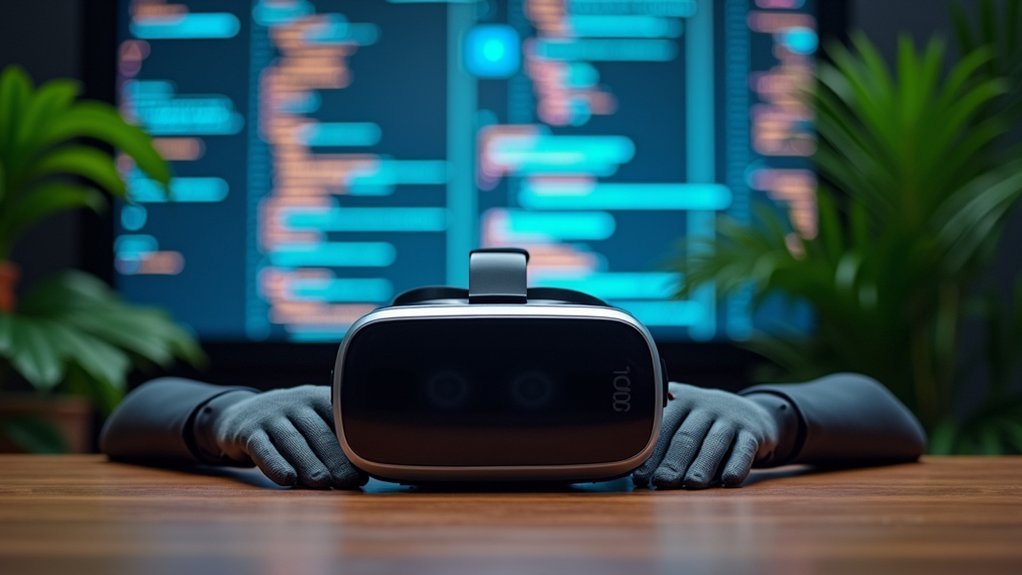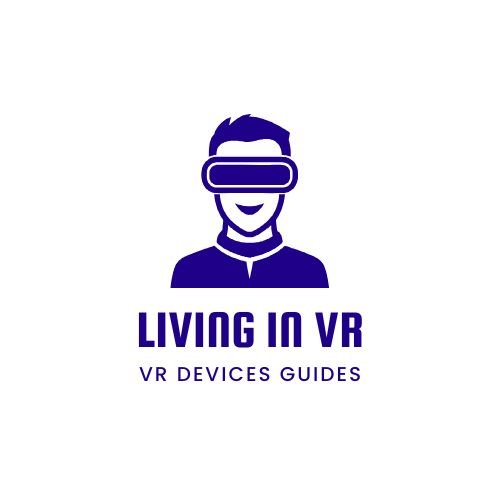When developing VR applications with machine learning capabilities, you’ll want to take into account TensorFlow for VR, which offers powerful deep learning integration with Unity and Unreal Engine plus GPU acceleration for real-time performance. Unity ML-Agents provides an excellent toolkit for creating intelligent virtual characters through reinforcement learning. OpenCV for VR delivers essential computer vision features like motion tracking and facial recognition. Each SDK brings unique strengths that can transform your virtual environments into truly adaptive experiences.
TensorFlow for VR: Integrating Deep Learning Capabilities Into Virtual Environments

When you’re looking to create intelligent VR experiences that respond dynamically to user behavior, TensorFlow stands out as a powerful framework for integrating deep learning capabilities directly into virtual environments.
You’ll find TensorFlow’s versatility supports essential machine learning tasks like image recognition, natural language processing, and reinforcement learning, making it ideal for enhancing your VR applications with advanced AI capabilities.
The framework’s seamless integration with Unity and Unreal Engine enables you to incorporate sophisticated machine learning functionalities without technical barriers.
You’ll benefit from GPU acceleration that boosts performance for real-time model training and inference, ensuring your interactive experiences maintain immersion.
Additionally, TensorFlow’s extensive library of pre-trained models and tools simplifies complex algorithm implementation, letting you focus on creating engaging content.
Unity ML-Agents: Building Intelligent Virtual Reality Experiences
Unity ML-Agents transforms your VR development process by providing an open-source toolkit that seamlessly integrates machine learning algorithms into Unity-based virtual environments.
You’ll create intelligent behaviors in virtual characters through reinforcement learning, imitation learning, and curriculum learning approaches. The Python API connects directly with TensorFlow and PyTorch, streamlining your machine learning workflow.
You can experiment quickly using included sample environments that demonstrate how AI-driven agents enhance immersive experiences. These intelligent systems adapt to user interaction patterns, creating more engaging virtual reality scenarios.
Whether you’re developing games or complex simulations, Unity ML-Agents enables your virtual characters to learn and respond dynamically, greatly improving user engagement in your VR projects through sophisticated machine learning capabilities.
OpenCV for VR: Computer Vision and Real-Time Object Recognition

OpenCV revolutionizes VR development by delivering powerful computer vision capabilities that enable real-time object recognition and sophisticated visual processing within immersive environments. You’ll find this open-source library essential for building VR applications that require motion tracking, facial recognition, and augmented reality interactions through its all-encompassing image processing toolkit.
| Feature | Capability | VR Application |
|---|---|---|
| Real-time Computer Vision | Motion tracking, object detection | Hand gesture recognition |
| Image Processing | Filtering, enhancement, analysis | Environmental mapping |
| ML Integration | TensorFlow, PyTorch compatibility | Predictive user interfaces |
OpenCV’s multi-language support across C++, Python, and Java allows seamless integration of machine learning models into immersive VR experiences. You’ll benefit from extensive community support and documentation when implementing advanced features like 3D reconstruction and intelligent object recognition systems.
Frequently Asked Questions
What Are the Licensing Costs for Commercial VR Machine Learning SDK Usage?
You’ll find licensing costs vary dramatically from free open-source options to enterprise fees reaching thousands monthly. Google’s MediaPipe costs nothing, while Unity’s ML-Agents and proprietary solutions charge based on usage tiers.
Which SDKS Offer the Best Cross-Platform Compatibility for VR Development?
You’ll find Unity’s XR Toolkit and Unreal Engine offer excellent cross-platform compatibility, supporting multiple VR headsets seamlessly. OpenXR’s becoming the industry standard, while frameworks like A-Frame enable web-based VR across various devices and platforms.
How Do These SDKS Handle Data Privacy in VR Applications?
You’ll find these platforms implement encryption protocols, anonymization techniques, and local data processing to protect user information. They’re designed with privacy controls that let you manage data collection and sharing preferences effectively.
What Hardware Requirements Are Needed for Optimal SDK Performance?
You’ll need a high-end GPU with at least 8GB VRAM, 16GB+ RAM, and a modern multi-core CPU. Don’t forget fast SSD storage and adequate cooling for sustained performance during intensive processing tasks.
Which SDKS Provide the Most Comprehensive Documentation and Community Support?
You’ll find TensorFlow and PyTorch offer the most thorough documentation with extensive tutorials, API references, and active community forums. Unity’s ML-Agents also provides excellent resources, while OpenXR delivers strong developer support networks.





Leave a Reply